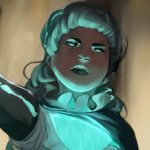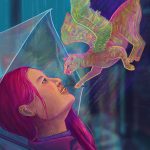“Someone chokes me in my sleep,” I answer.
“Who?” Mwamba asks as she unwinds the beads tied to her grey Bantu knots. She’s an n’ganga, a witchdoctor, a bootlegger of forbidden knowledge.
“A cousin. Dead.”
“Have you got something of theirs?”
I dangle an old pair of glasses.
“Come closer, child,” she coils the beads over the glasses in my open palms. The n’ganga rubs my cheekbones and hisses, “it’s true.”
I shudder. She bids me to study the markings on the beads: an unfamiliar symbol nestled among serpentine scrawling.
“Veve. Mark of a goddess,” she explains, “for protection.”
She scoops out a ladle of the bark-infused water boiling over the charcoal brazier. “Drink,” she insists when I blow air over the steaming ladle. I do…and sputter violently. Mwamba slaps my back. Hot tears stream down my cheeks. My tongue is singed and the tea makes me gag. I drink anyway.
“It’ll make the passage easier,” she assures me.
“Passage…where?” I slur as my head becomes weightless. The world swivels and I sway backwards. Grass cushions my fall. Above me the stars twinkle.
“Stars scar Nut’s body. Many dead. She wears their ghosts on her black skin like they were still alive,” Mwamba says, “like you wear your relative.” Her words ink the canvas of my mind.
Mirrors encircle my world. On their surfaces, light paints the portrait of a black girl fussing with stubborn hair. An older cousin plucks her nose. “Too fat!” he chuckles. This moment, those words, govern the sky of my mind. They shimmer, twirl and guide my thoughts whenever I linger on my reflection.
There’s a sphinx buried in the sand. It bellows as the emperor’s blue ants crawl all over its stone nose. Shadows creep along the edges of my sight. Whispers, unintelligible malice, are in my ears. There’s tightness across my chest. I can’t breathe!
I awaken with a gasp. Hunger turns my stomach into a thundercloud. My eyes drift to a pot of maize meal bubbling as Mwamba stirs it quietly. She tells me to describe my vision.
I do and lift the beads, “You said these would protect me?”
The n’ganga’s eyes gleam in firelight, “you’re still alive.”
“You’re the sphinx, ants your insecurities,” Mwamba adds solemnly. “He wounded you that day.” She tests the maize meal for its constitution. “You’ve been bleeding ever since,” she says.
Revelation comes easier the next day. Tea stains my lips,my thoughts become feather-light. The beads make a circuit about the ridge of my palm. They hiss and jump as we hum the goddess’ phone number.
Mirrors surround me. We’re in my uncle’s library. A power outage has cut the TV, which means my cousin must find some way to amuse himself. Printed words were always too stagnant for his restless mind.
“What are you reading?” he asks me.
I sigh, “Nothing that’d interest you.”
The Kinshasa flavouring of my accent amuses him. “A foreign accent only works on pretty girls,” he chides back.
I put down my book, “Find someone else to bother.”
He laughs a great deal before finally leaving. An outward calm hides my deep hurts.
The sphinx lies with leonine jaws agape as sand fills its mouth. Shadows fill my mouth, bind my tongue. Fingers tighten about my neck. I can’t breathe!
I cough and rub my throbbing throat.
“You’ve let him steal your speech,” Mwamba says when I recount the vision.
“My dreams are getting worse. How can he still affect me?”
The witchdoctor shakes her head: “Your wounds draw monsters. Ilomba, the Strangler, has you. It hides behind your cousin’s face.”
The hairs on my arms stand, “wh-what?”
She shushes me. “We’ll unbind your tongue. Like the sphinx, the lioness, you must open your mouth and roar.”
“How?”
“Every place you’re marked, every dead star, we remake in your image.”
So we go back first to that mirror with its light rippling across polished aluminum. He plucks at my nose. Instead my black nose becomes the stone image of the ancient queens of Khemet. I blow him away with a black wind.
Then we go back to the library and my gaping mouth brings a roar. Like Nut, that goddess of Old Egypt, I wear my scars on my black skin. Not as wounds but as hieroglyphs to be forever etched in history.
When he isn’t feeding his noisy team of Pekin ducks or tending his garden, Gomezyani Morton Msiska prefers to while the summer hours away beneath the needle-leaved Acacias that dot his hometown of Lusaka in the company of good friends (urban farming is a patient endeavour). Though passionate about writing since his clumsy attempt at epic fantasy when aged 12, Gomezyani has struggled to complete a single short story in the intervening years (a fact he attributes to maddening perfectionist streak that only manifests itself where his writing is concerned and nowhere else). He cites Chinua Achebe, Ben Okri, Anne Rice, Robert Jordan, George R R Martin, HP Lovecraft and Robert W Chambers as the biggest influences on his writing
Photo by José Ignacio Pompé on Unsplash






